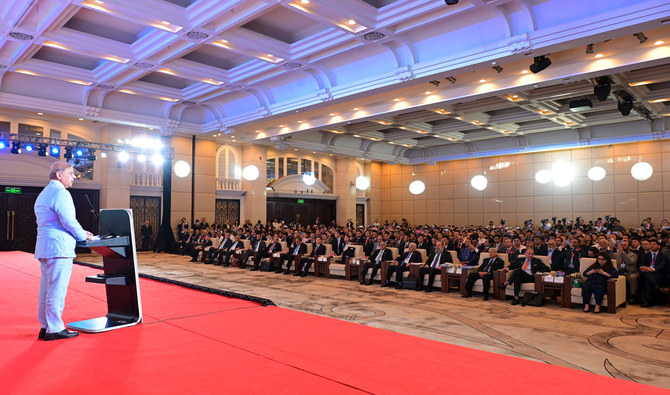ISLAMABAD: Pakistan’s Prime Minister Shehbaz Sharif arrived in Beijing on the second day of his five-day visit to China on Wednesday, he is scheduled to meet the top Chinese leadership including President Xi Jinping and oversee the signing of trade and investment agreements in various fields, amid Islamabad push for enhanced economic cooperation with its ally.
Sharif was received by Chinese Vice Foreign Minister Sun Weidong upon his arrival at the Beijing airport. The premier is accompanied by a high-level delegation comprising the Deputy Prime Minister and Foreign Minister Ishaq Dar and other members of the cabinet and senior officials, a statement from Sharif’s office said.
“The Prime Minister has an extensive program in Beijing reflecting depth and breadth of Pakistan-China ties,” the Prime Minister’s Office (PMO) said.
“He will meet the President, the Premier and the Chairman of the Standing Committee of the National People’s Congress.”
Sharif will also attend a Pakistan-China Friendship and Business event, and hold meetings with the chief executive officers of leading Chinese companies working on the China-Pakistan Economic Corridor (CPEC) projects.
“A number of MoUs between the two countries on cooperation in various fields are likely to be signed,” the statement said.
’FULL SUPPORT’ FOR CHINESE INVESTORS
Earlier, the prime minister said his administration would provide “full support” to Chinese investors entering Pakistan’s market, as the South Asian nation seeks to woo foreign investors amid efforts to stabilize its $350 billion economy.
The premier was speaking at a joint business forum in Shenzhen, a major global technology hub, where he arrived on Tuesday for the first leg of his visit to China from June 4-8. At the top of the agenda are business-to-business meetings and efforts to seek an upgrade for CPEC, a flagship of President Xi Jinping’s Belt and Road Initiative, through which Beijing has pledged over $60 billion in energy and infrastructure Pakistan since 2015.
Islamabad now hopes CPEC collaborations will enter the industrial, IT and agricultural sectors and is encouraging the involvement of the private sector and business-to-business (B2B) engagements.
Around 79 Pakistani companies are in China to attend the business forum in Shenzhen.
“Today is the opportunity, today is the time,” Sharif said in his address to Pakistani and Chinese executives. “Today is the moment for you to capture, sit down with our Chinese friends and brothers and have serious discussions.
“I want to assure you as not only as the prime minister of Pakistan but as the chief executive officer of Pakistan that I will give you full support like never before to promote your efforts to stitch these deals so that Pakistan and Chinese businessmen they benefit jointly have mutual benefits.”
In his address at the forum, Federal Minister for Finance and Revenue Muhammad Aurangzeb laid out the government’s broader roadmap, emphasizing export-led growth and the crucial role of special economic zones. He said Pakistan was seeking foreign direct investment through government-to-government and business-to-business arrangements and aimed to access international capital markets and tap into Panda Bonds, Renminbi (RMB)-denominated bonds from a non-Chinese issuer, which are sold in mainland China.
Aurangzeb acknowledged “temporary hiccups” in payments and repatriations for Chinese companies but assured that such issues would soon be resolved.
Pakistan has frequently sent high-level official delegations to China, its closest regional ally, in the past. However, most of these visits have been to Beijing and revolved around state-level interactions between the top officials of the two countries.
Sharif’s latest visit comes at a time when his administration is actively trying to put Pakistan’s economy back on track amid prolonged financial troubles that have compelled the country to repeatedly urge friendly nations and international lenders for loans.
In recent months, Pakistani authorities have said they are no longer striving to borrow money from allies but asking them to make “mutually beneficial” investments and explore the possibility of collaborating with local businesses.
Chinese investment and financial support since 2013 have been key for the South Asian nation’s struggling economy, including the rolling over of loans so that Islamabad can meet its external financing needs at a time when its foreign reserves are critically low.
B2B MEETINGS
Earlier, the prime minister met with Zhu Zhaojiang, the founder and chairman of Transsion Holdings, a Chinese multinational company specializing in manufacturing mobile phones.
Zhu expressed interest in expanding investment in Pakistan, particularly in mobile manufacturing units and exploring opportunities in electric bikes, modern agriculture and fintech sectors, according to a statement from Sharif’s office.
The prime minister directed federal ministers and Pakistan’s ambassador to China to swiftly develop a plan of action for Transsion and encouraged the company to produce locally and increase exports from Pakistan whose greatest strength was its young workforce.
During the meeting, Zhu informed Sharif about his company’s existing operations in Pakistan, its global exports and plans for further investments, including an already established unit that employs over 5,000 Pakistan nationals.
On Wednesday afternoon, Sharif also visited the Nanshan One-Stop Service Center and Shenzhen Exhibition Museum and directed his ministers to “immediately coordinate with the Center to replicate a similar modern system in Pakistan,” state-run APP reported.
“He was briefed about the digital system established at the Center to register companies and carry out other processes under one roof. He lauded the modern systems developed at the Nanshan One-Stop Services for the registration of companies and businesses,” APP said.
“He also directed the relevant authorities to take necessary measures to establish a similar system in the country with Chinese cooperation.”
The prime minister also visited the Shenzhen Exhibition Museum where he was briefed about the development journey of Shenzhen city, as well as
the headquarters of Huawei in Shenzhen where he was received by the company’s chairman Liang Hua.
“Chairman Huawei informed the Prime Minister about the operations of Huawei around the world, especially in Pakistan, and expressed deep interest in investing in various sectors of Pakistan,” PMO said.
“The Prime Minister appreciated the innovation of Huawei’s operations and encouraged Huawei to expand its investment in Pakistan.”
After a briefing on e-governance, digital banking, telecommunication and artificial intelligence, Sharif invited Huawei to establish Safe City projects on a priority basis in Pakistan, especially in cities where work on CPEC projects was ongoing.
“The government is taking steps to digitize government offices on a priority basis,” Sharif said. “There are vast investment opportunities in Pakistan for a big company like Huawei in the fields of tax system, e-governance and artificial intelligence.”
Sharif also invited the chairman of Huawei to invest in modern technology in the agricultural sector in Pakistan and attended the signing ceremony of a framework agreement between Huawei and the Pakistani science ministry.
Under the framework agreement, Huawei will provide free training to 200,000 Pakistanis in the field of information technology including artificial intelligence and provide full support in the establishment of Safe Cities, e-governance and digitization of the economy in Pakistan.
During the China visit, the Pakistani prime minister will also meet President Xi Jinping and other senior officials in Beijing before concluding the five-day trip on June 8.
Pakistan seeks to woo Chinese investors at business forum, B2B meetings
https://arab.news/ry6gm
Pakistan seeks to woo Chinese investors at business forum, B2B meetings

- Prime Minister Shehbaz Sharif is on five-day visit to China from June 4-8
- Sharif to meet Chinese leadership, including President Jinping, in Beijing
Pakistan’s Khyber Pakhtunkhwa calls for talks with Afghanistan to address militancy

- The provincial administration held a meeting with religious and political leaders to discuss the issue
- Chief Minister Gandapur says a jirga will be formed for result-oriented negotiations with Afghanistan
PESHAWAR: The administration of Pakistan’s militancy-hit northwestern Khyber Pakhtunkhwa (KP) province on Saturday called for government-level negotiations with Afghanistan, announcing that it would constitute a jirga, or a traditional tribal council, to engage with authorities in Kabul, according to an official statement.
The statement followed a consultative meeting convened by the KP administration under the title “National Unity Against Terrorism,” bringing together representatives from various religious and political parties. The discussions come amid a sharp rise in militancy in the region, including suicide bombings, attacks on civilians and security forces and kidnappings of local businessmen and government functionaries.
Pakistan’s top military and political leadership has blamed the surge in violence on Tehreek-e-Taliban Pakistan (TTP) militants launching cross-border attacks from Afghanistan, accusing Kabul’s administration of harboring and facilitating them, though the allegation is denied by the Afghan authorities.
The country’s security forces have also conducted intelligence-based operations against militant hideouts in KP and has reportedly launched airstrikes inside Afghanistan to target TTP militants. However, the consultative session in KP called for a more peaceful approach, seeking the government to engage in constructive talks with Afghan authorities.
“The security situation in our province is directly linked to developments in neighboring Afghanistan,” Chief Minister Ali Amin Gandapur said, according to an official statement circulated after the meeting.
“To find a lasting solution to the issue of terrorism in the country, there is a need for government-level negotiations with Afghanistan,” he added.
“A jirga will be formed to hold meaningful and result-oriented negotiations with Afghanistan,” Gandapur said, referring to the traditional tribal assembly system used for conflict resolution and decision-making in Pashtun-majority areas.
KP’s administration is run by former prime minister Imran Khan’s Pakistan Tehreek-e-Insaf (PTI) party, which has historically advocated negotiations with TTP to resolve militant violence.
The federal government in Islamabad, however, argues that past talks with militants only allowed them to regroup and launch more deadly attacks against Pakistan’s security interests.
Islamabad has repeatedly pressed Kabul to eliminate TTP sanctuaries inside Afghanistan, while the Afghan Taliban have called for dialogue instead of military action.
Pakistani and Saudi finance chiefs discuss boosting strategic ties ahead of AlUla conference

- Muhammad Aurangzeb brings up enhanced bilateral trade, investments and collaboration with his counterpart
- The ministers emphasize the need for continued economic dialogue, increased cooperation through joint initiatives
KARACHI: Saudi Arabia and Pakistan on Saturday discussed unlocking the full potential of their strategic relationship, as the finance chiefs of both countries met ahead of the Emerging Markets Conference in AlUla, Saudi Arabia, according to an official statement.
Pakistan’s Finance Minister Muhammad Aurangzeb arrived in the Kingdom to attend the two-day conference, which begins on Sunday, at the invitation of his Saudi counterpart Mohammed Al-Jadaan.
The annual economic policy forum is organized by the Saudi finance ministry in collaboration with the International Monetary Fund (IMF) regional office in Riyadh. The event will bring together emerging market finance ministers, central bank governors, policymakers, public and private sector leaders, international institutions and academics.
“The meeting [between the two finance chiefs] underscored a shared commitment to build bridges of economic cooperation and advance mutual prosperity,” Pakistan’s finance ministry said in a statement after Aurangzeb’s interaction with Al-Jadaan.
“The discussions highlighted opportunities for enhancing bilateral trade, investments and financial collaboration, with both ministers expressing their dedication to unlocking the full potential of their countries’ strategic partnership,” it added.
Pakistan is navigating a fragile economic recovery under a $7 billion IMF loan program secured in September 2024, after implementing austerity measures and policy reforms to avert a sovereign default in 2023.
To facilitate Pakistan’s economic recovery, Saudi Arabia signed 34 memorandums of understanding (MoUs) worth $2.8 billion last October to boost private sector investment in key areas, including energy, infrastructure and technology.
During their meeting, the two ministers explored avenues for collaboration in infrastructure, energy, technology and finance, emphasizing the need for continued dialogue and joint initiatives to facilitate investment flows and economic opportunities that could benefit the broader region.
According to an earlier statement by Pakistan’s finance ministry, Aurangzeb is scheduled to participate in a high-level panel discussion titled “The Path to Emergent Markets,” hosted by IMF Managing Director Kristalina Georgieva.
The conference will feature nine sessions, with 200 participants and 36 speakers, focusing on economic resilience, financial policies for emerging markets and global economic challenges.
The discussions come at a time when the world economy is facing persistent shocks, trade tensions between major world powers, geopolitical instability and tight financial conditions.
“The conference will provide a unique platform for world leaders to discuss and analyze domestic, regional and global economic conditions and developments and to exchange ideas on solutions to global challenges,” the Pakistani finance ministry added.
Pakistan, Saudi military officials agree to deepen defense and security ties

- General Sahir Shamshad Mirza is in Saudi Arabia for the Joint Military Cooperation Committee meeting
- His discussions with Saudi officials focused on military exchange programs, ongoing training initiatives
KARACHI: Senior Pakistani and Saudi military officials have agreed to further consolidate bilateral defense and security cooperation during their meetings in the Kingdom, the Inter-Services Public Relations (ISPR) said in a statement on Saturday.
Pakistan’s Chairman Joint Chiefs of Staff Committee General Sahir Shamshad Mirza is currently visiting Saudi Arabia to attend the 8th round of the Pakistan-Saudi Joint Military Cooperation Committee (JMCC) meeting.
The Kingdom remains one of Pakistan’s key defense and security allies, with ties encompassing a range of activities, including counterterrorism collaboration.
“Both sides reviewed the ongoing cooperation between Armed Forces of Pakistan and Saudi Arabia, focusing on mutual exchange programs, training initiatives and other defense-related activities,” the ISPR said.
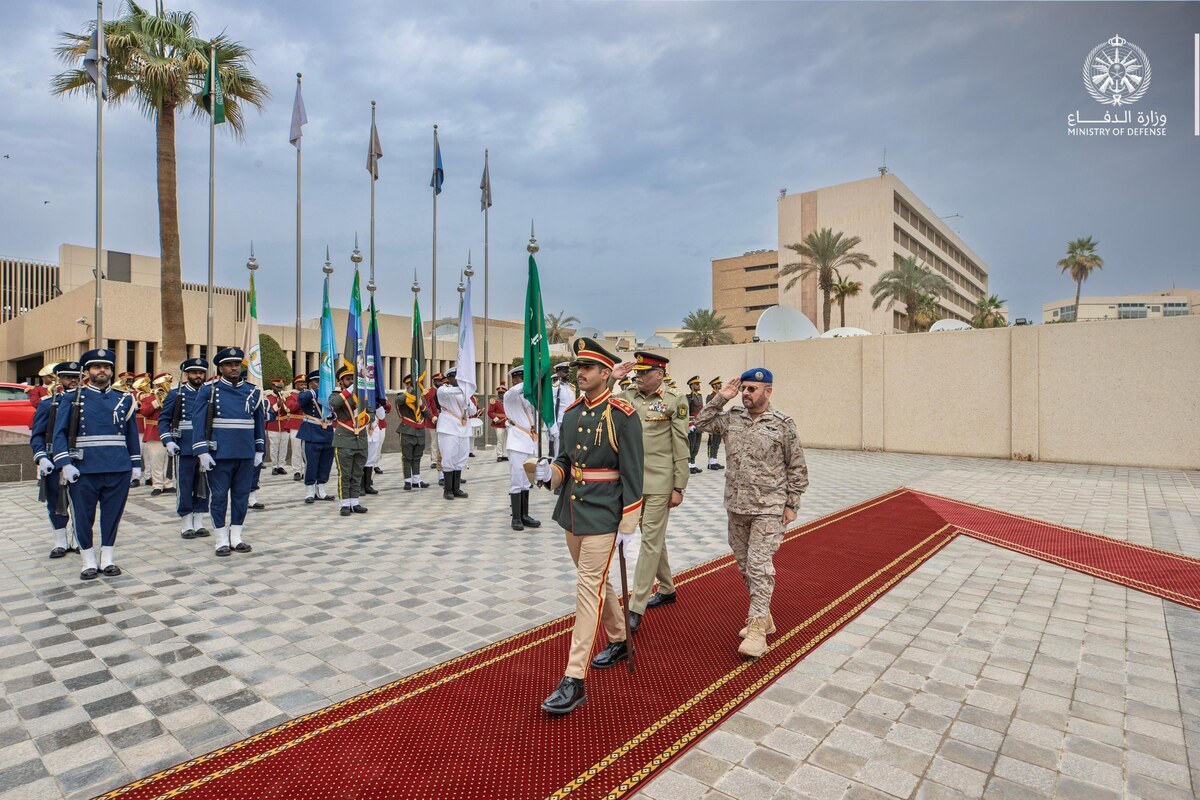
“The military leadership reaffirmed their commitment for further strengthening existing defense and security cooperation between the two brotherly countries,” it added.
During his visit, General Mirza held meetings with Major General Talal Bin Abdullah Al-Otaibi, Assistant Minister of Defense, and General Fayyadh bin Hamed Al-Ruwaili, Chief of General Staff of Saudi Arabia.
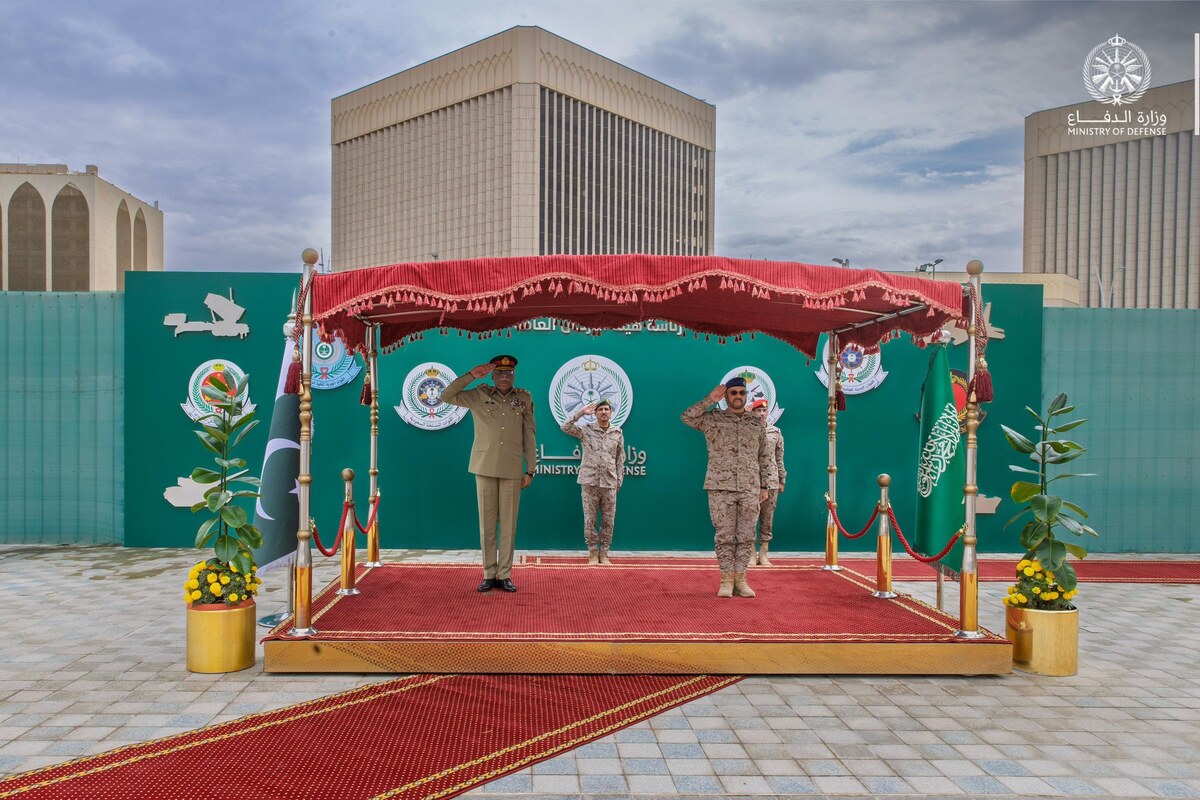
Their discussions covered strategic and security issues, the evolving regional environment and bilateral defense collaboration.
The JMCC meeting, which Mirza and Al-Ruwaili co-chaired, serves as a key platform for defense dialogue and coordination between the two nations.
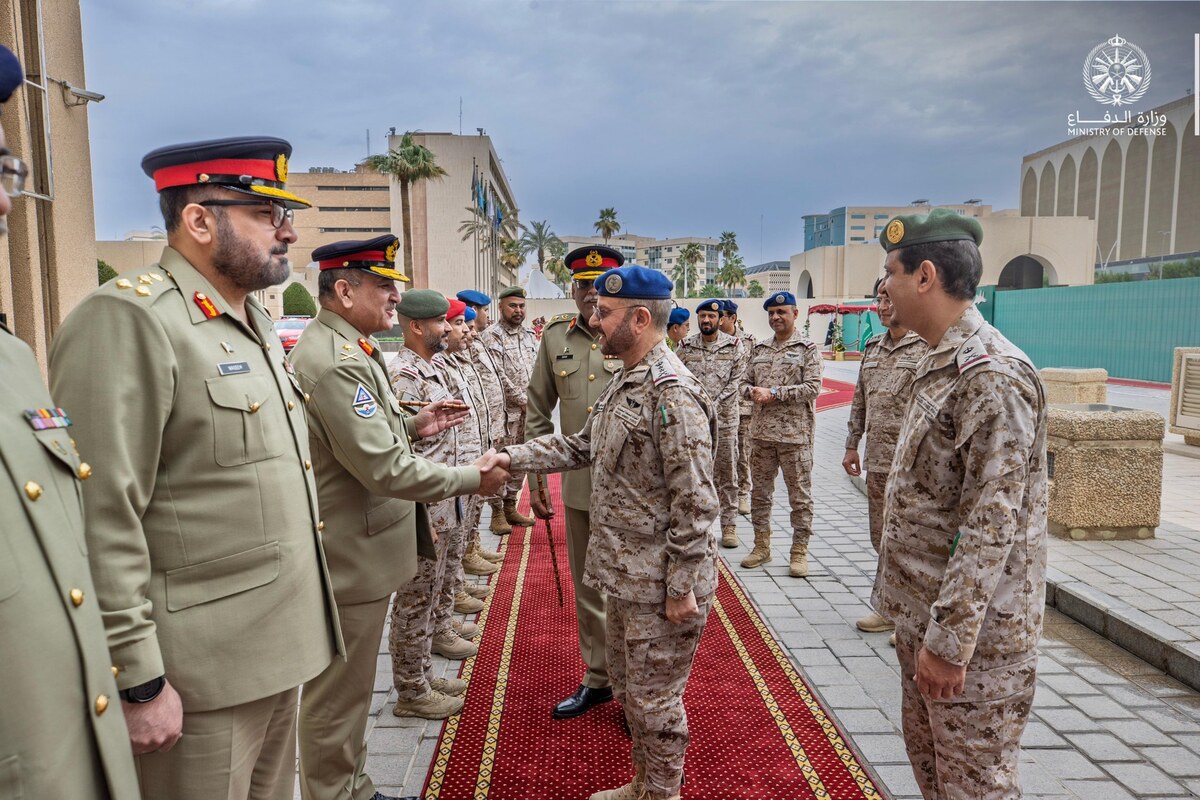
The ISPR said Saudi military officials praised the professionalism of Pakistan’s armed forces and acknowledged their sacrifices in the fight against militancy.
Upon his arrival at the Armed Forces Headquarters in Saudi Arabia, General Mirza was given a Guard of Honor by a smartly turned-out military contingent, reflecting the strong defense ties between the two nations.
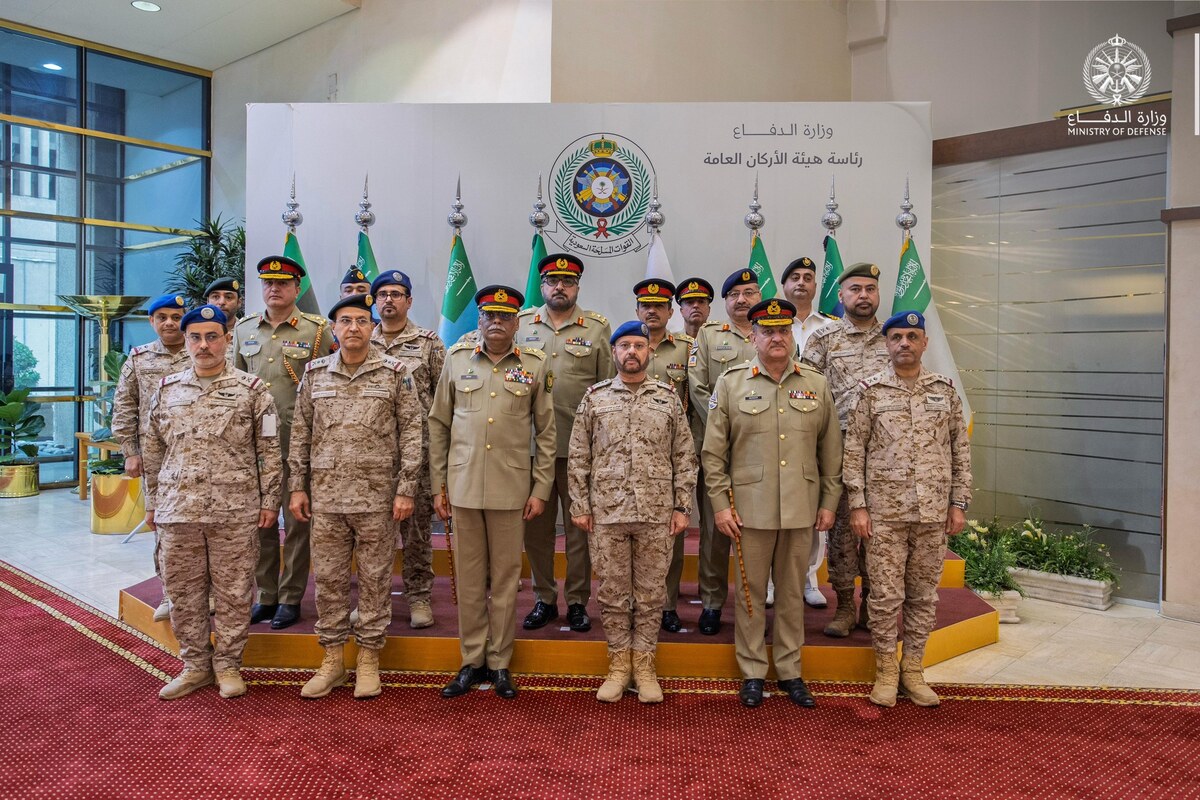
Pakistan’s interior minister calls for global unity against militant violence in meeting with US envoy

- Mohsin Naqvi expresses optimism that Pakistan-US ties will strengthen under President Donald Trump
- His recent meetings with US lawmakers focused on combating militancy, strengthening bilateral ties
ISLAMABAD: Pakistan’s Interior Minister Mohsin Naqvi on Saturday described militant violence as an international challenge, calling for global solidarity to combat the threat during a meeting with US Chargé d’Affaires Natalie Baker.
Baker assumed the role at the US Embassy in Islamabad in January, following the departure of Ambassador Donald Blome. The position is a temporary appointment, with her responsibilities including engagement with Pakistani officials on bilateral issues until a new envoy is confirmed.
“Terrorism is an international issue, and the global community must work together to address it,” Naqvi said during the meeting.
He also recalled his recent official visit to the United States, which took place earlier this month. The trip focused on bilateral cooperation, counterterrorism strategies and security concerns.
“The meetings with US Congress members were extremely positive,” the minister said. “Discussions focused on developing a joint strategy to combat terrorism and further strengthening bilateral relations.”
Pakistan and the US have historically cooperated on counterterrorism efforts, with both sides benefiting from intelligence-sharing support.
More recently, the US has repeatedly expressed support for Pakistan’s security concerns, particularly as Islamabad blames rising militant violence on cross-border attacks from Afghanistan — an allegation denied by authorities in Kabul.
Naqvi expressed optimism that Pakistan-US relations would strengthen under President Donald Trump’s administration.
He also invited Baker to attend Islamabad’s upcoming spring festival celebrations.
Pakistan army says officer, three soldiers killed in anti-militant operations in northwest

- Security forces killed 15 Pakistani Taliban in two separate operations in Dera Ismail Khan and North Waziristan
- The militants were involved in numerous violet activities in the area and were wanted by law enforcement agencies
ISLAMABAD: An officer and three soldiers were killed on Saturday as security forces launched two separate operations against militants in Pakistan’s northwest, the military’s media wing, Inter-Services Public Relations (ISPR), said in a statement.
The intelligence-based operations took place in Hathala, Dera Ismail Khan District, and Miran Shah, North Waziristan District. Both the areas, along with the rest of Khyber Pakhtunkhwa province, have seen a surge in militant violence since the collapse of a fragile ceasefire agreement between the government and the banned Tehreek-e-Taliban Pakistan (TTP) in late 2022.
Pakistan brands TTP fighters as “khwarij,” a historical reference to an extremist sect in early Islam known for rebelling against authority, declaring other Muslims as apostates, and justifying their killing.
“An intelligence-based operation was conducted by the Security Forces in general area Hathala, Dera Ismail Khan District, on reported presence of Khwarij,” the ISPR said. “During the conduct of operation, own troops effectively engaged the khwarij location and resultantly, nine khwarij including Kharji ring leaders HVT [high-value targets] Farman [alias] Saqib, Kharji Amanullah [alias] Toori, Kharji Saeed [alias] Liaqat, and Kharji Bilal were sent to hell.”
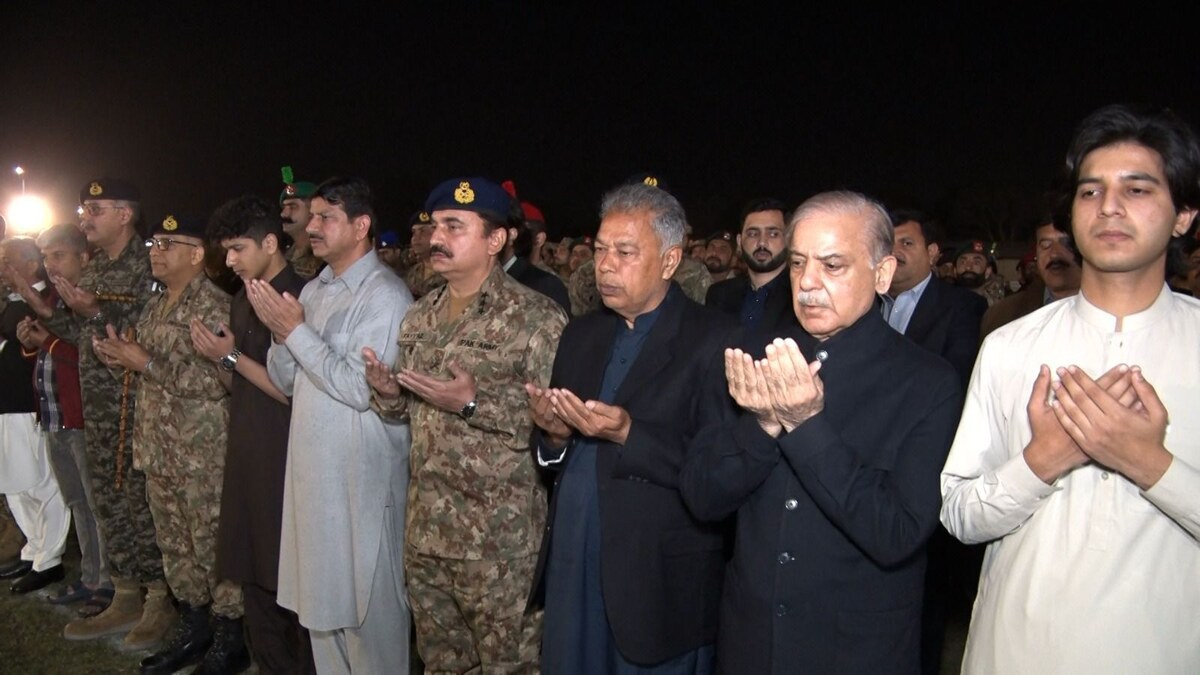
The statement added all these militants were involved in numerous violet activities and were wanted by law enforcement agencies.
“In another operation conducted in general area Miran Shah, North Waziristan District, six khwarij were effectively neutralized by the security forces,” the statement continued.
“However, during intense fire exchange, Lt. Muhammad Hassaan Arshaf (age: 21 years, resident of District Lahore) leading his troops from the front, fought gallantly and embraced Shahadat along with his three men,” it added.
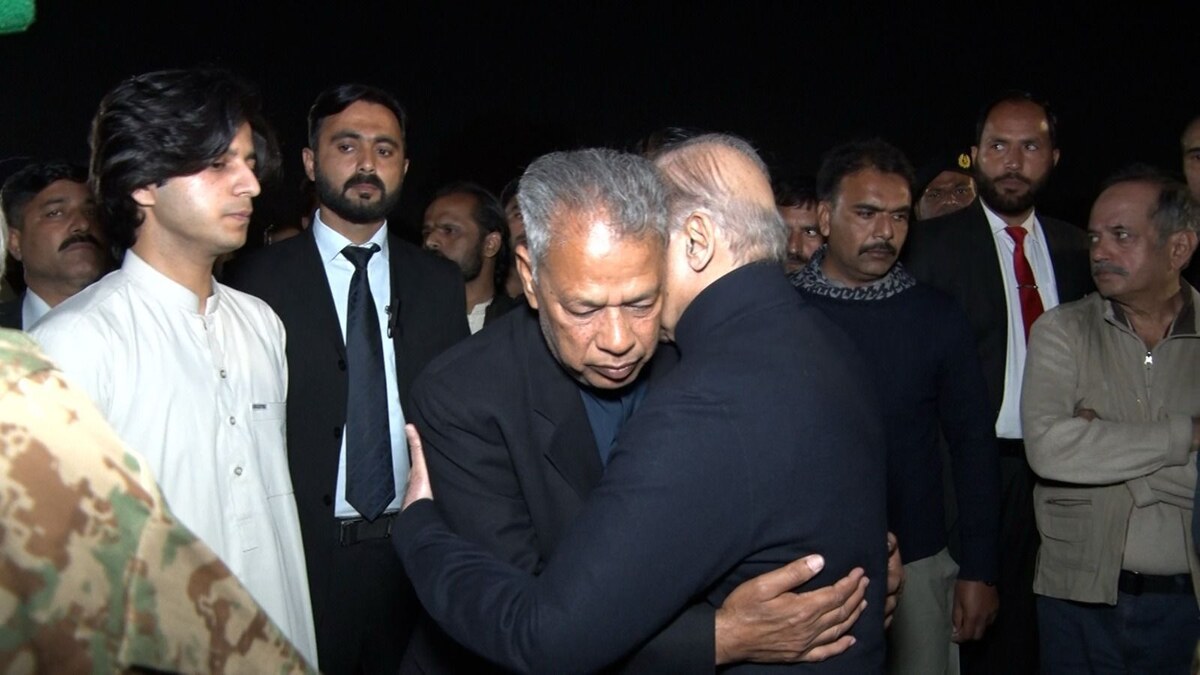
The military said sanitization operations were underway to clear any remaining militants, reiterating its determination to eliminate militancy from the region.
The Pakistani military has intensified operations against TTP hideouts, vowing to wipe out the group, which Islamabad accuses of carrying out cross-border attacks from Afghanistan. The Taliban-led government in Kabul, however, denies providing safe havens to Pakistani militants.


